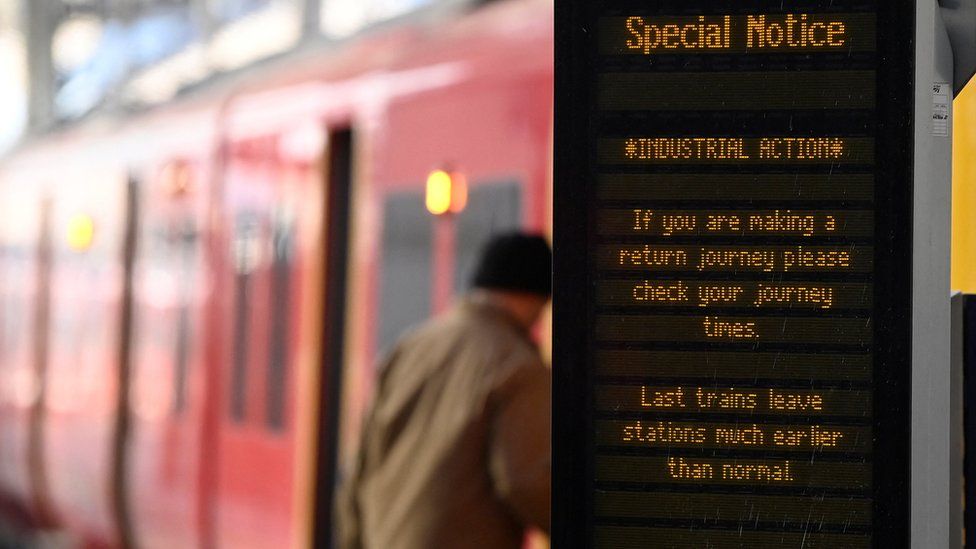Train strikes: How May's industrial action at 16 rail companies affects you
- Published

Rail travel during the week of the May Bank Holiday is to be disrupted by new industrial action.
Train drivers at 16 rail companies are holding strikes between Tuesday 7 and Thursday 9 May. An overtime ban will fall between Monday 6 and Saturday 11 May.
What lines are affected in May's strikes?
The action is likely to lead to cancellations, delays and no services in some areas.
Passengers are advised to check before they travel.
Drivers from the train companies below will stage walkouts on different days:
- Tuesday 7 May: c2c, Greater Anglia, Great Northern, Thameslink, Southeastern, Southern, Gatwick Express, South Western Railway main line and Island Line
- Wednesday 8 May: Avanti West Coast, Chiltern Railways, CrossCountry, East Midlands Railway, Great Western Railway and West Midlands Trains
- Thursday 9 May: LNER, Northern Trains and TransPennine Express
A London Underground drivers' strike on Saturday 4 May has been cancelled.
Can I get my money back for strike days?
Rail passengers with advance tickets can get refunds if the train they are booked on is cancelled, delayed or rescheduled due to strikes.
If passengers have a return ticket they may also be entitled to a fee-free refund if part of the journey is cancelled.
Season ticket holders (flexi, monthly or longer) who cannot travel, can claim 100% compensation for strike dates.
What are the strikes about?
Aslef, the train drivers' union, is seeking better pay for its members. It says drivers are being asked to sacrifice working conditions in exchange for a wage increase.
Strike action began in July 2022 with no formal talks since April 2023, when the most recent pay deal was rejected.
The offer, described as "risible" by Aslef, included 4% pay rises two years in a row, on condition drivers accept changes to training and negotiate new work patterns.
Train operators say ways of working need to change for wages to rise, because of financial challenges and fairness to taxpayers.
The body which negotiates on behalf of the rail companies, the Rail Delivery Group, says it continues to "seek a fair agreement".
Are more train strikes planned?
Unions need to re-ballot members every six months to see if they want to continue with industrial action.
Currently, unions are obliged to give at least 14 days' notice of any strike action.
In November last year, RMT members, including guards and ticket office staff, voted to accept a pay offer. This included a backdated pay rise of 5% for 2022-23 and job security guarantees.
Talks over future pay deals and working practices will continue.
What is the minimum service levels law?
A new law means train companies can require enough staff to work on strike days to run 40% of services.
The Department for Transport said it expects employers to use minimum service levels "if appropriate to do so, and to deliver the best possible service".
However, industry insiders told the BBC the rules were complicated to put in place. One source said it meant co-ordinating a reduced timetable with other operators in a short space of time.
The Rail Delivery Group, an membership organisation of Britain's train operating companies, said minimum services levels was a potential tool but not a "silver bullet".
Unions strongly oppose it.
How much are rail workers paid?
The Office for National Statistics (ONS) says median pay for "train and tram drivers" is just under £59,000.
Train companies and the government say the offer rejected by Aslef would take average train driver pay to £65,000.
The average salary of rail workers in 2022 was £45,919, according to the ONS.
If drivers are excluded (because they tend to be members of the Aslef union, not RMT) its estimate is £39,518. However, the RMT union said that figure was too high because it does not include rail cleaning staff.
Will you be affected by the strikes? Get in touch by emailing [email protected].
Please include a contact number if you are willing to speak to a BBC journalist. You can also get in touch in the following ways:
- WhatsApp: +44 7756 165803
- Tweet: @BBC_HaveYourSay
- Upload pictures or video
- Please read our terms & conditions and privacy policy
If you are reading this page and can't see the form you will need to visit the mobile version of the BBC website to submit your question or comment or you can email us at [email protected]. Please include your name, age and location with any submission.
Sign up for our morning newsletter and get BBC News in your inbox.
- Published22 January
- Published1 August 2023